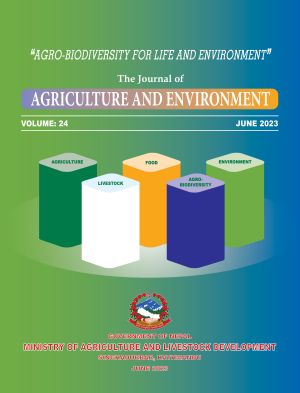Assessment of Late Sown Wheat (Triticum aestivum L.) Genotypes under High Temperature Stress Conditions
DOI:
https://doi.org/10.3126/aej.v24i01.58076Keywords:
Wheat, genotypes, late sown, high temperature stress, grain yieldAbstract
In recent years, climate change has led to an increase in extreme weather conditions, including high-temperature stress. High temperature stress is the term for an increase in temperature (> 30°C) following anthesis during grain development. Wheat is particularly vulnerable to high temperature stress, and its productivity is severely affected. With the objective of identifying wheat genotypes tolerant to heat stress in terms of grain yield, a total of fifty wheat genotypes were evaluated under heat stress conditions at Directorate of Agricultural Research, Lumbini Province, Khajura, Banke in 2021/22. There was highly significant difference (<0.001) among genotypes for yield. The association between the grain yield (GY) and the biomass yield (BM), thousand grain weight (TGW), and spike number per meter square (SPMS), was highly significant and positive. The highest harvest index value of 0.59 and the highest grain yield were achieved from 20HTWYT#36 (4133 kg/ha), followed by Bandganga (3992 kg/ha), 20HTWYT#23 (3978 kg/ha), 20HTWYT#11 (3943 kg/ha), and 20HTWYT#05 (3758 kg/ha) exhibiting higher tolerance to high temperature stress and indicating the potential for this genotypes to be used as domain specific varieties suitable for heat stress conditions of Banke district and for
breeding climate resilient varieties in the future.




